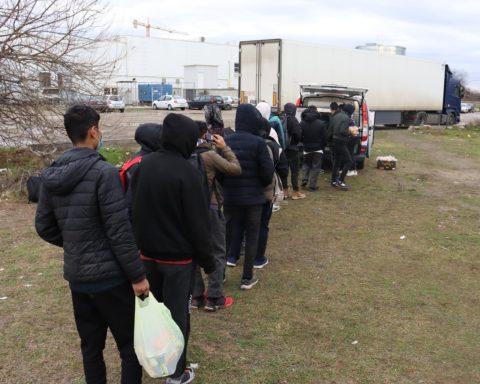Text and translation: Leone Palmeri
This is the third article in the research project that started in Timișoara and ended in Sofia, passing through Šid, Subotica and Belgrade. During our research we met people who are trying to get into Europe, in order to understand their main struggles and understand how local and international organizations support people on the move.
On August 4th we drove north east towards Subotiça, a city in the north of Serbia on the Hungarian border. Because of its proximity to Hungary and Croatia, this small town over the years has become a strategic node along the Balkan Route towards Northern Europe, with thousands of people each month passing through the Serbian government’s camp, and the informal settlements in the area surrounding the city.
During our stay in Subotiça we were hosted by the Collettivo Rotte Balcaniche Alto Vicentino, an activist group from northeastern Italy that supports people on the move on the Balkan Route, providing them the chance to take a shower, and working with NGOs and independent activists that support people on the move in the region.
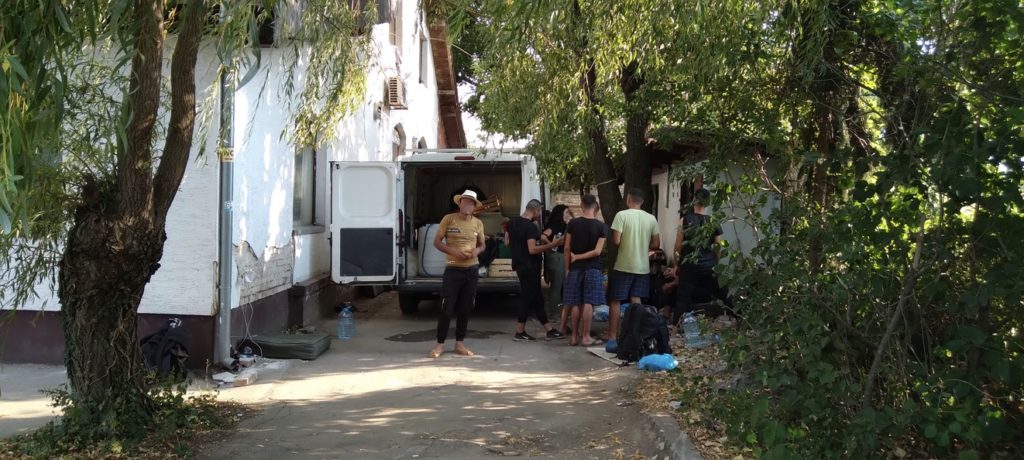
We followed the group during its distributions for one day, to see how they worked, and to get familiar with the various squats in the countryside surrounding the city. As in Šid 1, in the early morning we helped them prepare and load their van with food, water, and portable showers that they distribute on a regular basis, along with a group of No Name Kitchen volunteers, and a group from Medical Volunteers International.
After about an hour’s drive, we got to an abandoned factory near a town called Sombor, where about 200 people were temporarily living. As we rolled up in the white van under the midday sun, the men hanging out in the shade under the trees, and various broken down buildings that faced the gravel courtyard, started to stand up coming towards the vehicle, gathering around us, recognizing the volunteers, and greeting us all.
“Salam alaikum! kaif halak” we heard as we got close enough, opened the doors to get out, and shook hands with the small crowd of young men. Unlike in Šid, these people seemed to be older, and no Afghans appeared to be living in this settlement; it was all people from Arabic speaking countries, mostly from Syria, but also from Egypt and Palestine.
We started to unload the van, setting up the green portable showers, and organizing the crates of tomatoes, potatoes, rice, bread and apples. In the back of the van, two plastic tanks held about 500 liters of water each, and as soon as we had set up the hoses to feed the showers and to fill up water bottles, people started to stand around with various sized and shaped plastic containers.
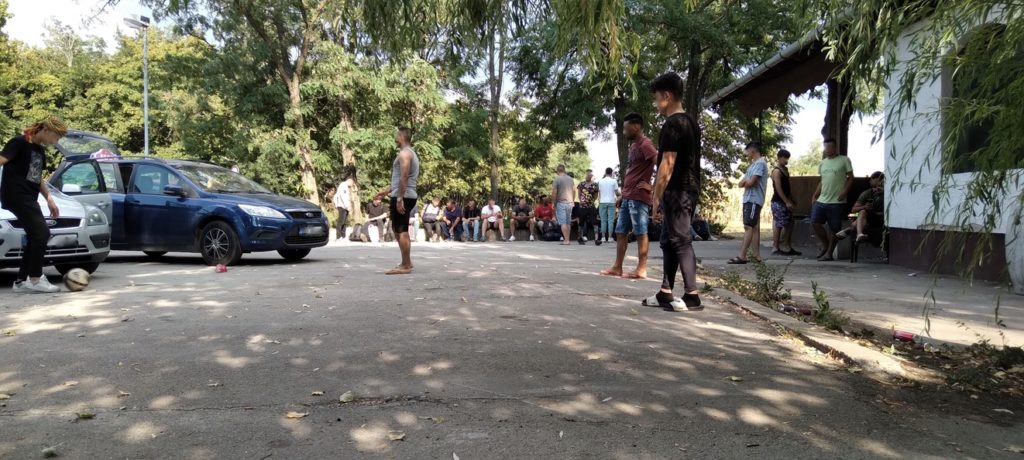
They all knew the procedures, it was clearly something they did on a regular basis, some even showed newly arrived volunteers which switches to flip to get the showers to warm up. Our arrival felt like a significant event on that summer day at the abandoned factory. Various circles of people gathered in the area in front of the buildings, standing or sitting in the little shade, shared a cigarette and a few words with the volunteers, recognizing them from other distributions, or even other squats.
In most conversations spilling from the small circles, one could hear a few “inshallah” and “alhamdulillah” mixed in with the English sentences, along with the occasional bursts of laughter, or handshake.
About an hour later, the water tanks in the van were almost half empty, in front of the showers there were two streams of soapy water swirling in little pools, and just a few people waiting in line while holding a towel. They helped whoever was washing to get their clothes, regulate the temperature of the water, or pass them some shampoo.
Two volunteers stood in the back of the van, while fishing out food in paper bags from the wooden crates, and giving it to the group of refugees that had gathered around the truck. Others standing by the side sliding door, gave out toothbrushes, toothpaste, soap, and other basic items for personal hygiene to the people that had not gotten any earlier.
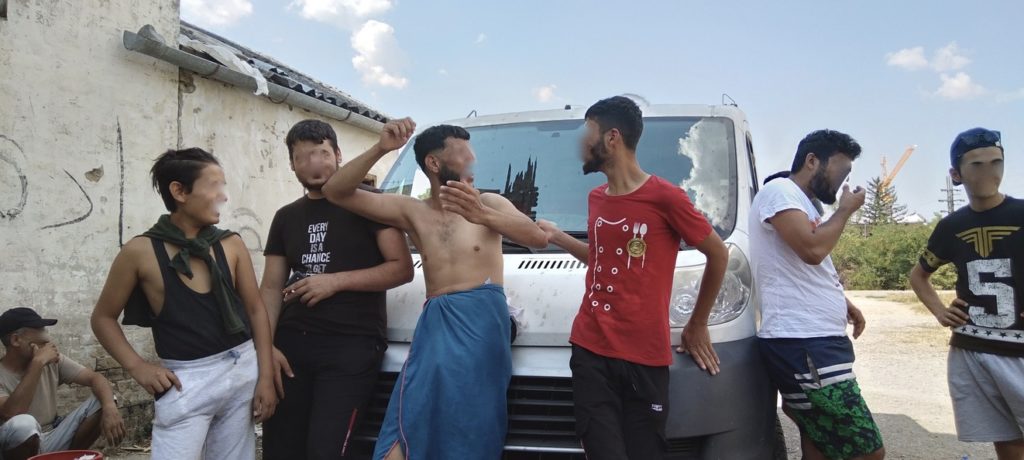
In one afternoon in the abandoned factory, we saw children as young as 5 years old traveling with their siblings and fathers, as well as many men between 15 and 60 years old traveling alone or in small groups. The only ones missing were the women, which seemed to be moving through other settlements.
The people we talked to came from various backgrounds, and no clear pattern seemed to link them all. However they came from the same countries, they shared the experience of the trip, and would all probably sooner or later try to pass the double barbed wire fence on the Hungarian border with four ladders, while smugglers keep watch for police cars.
A young man that spoke fluent English told us he was a pharmacist in Syria, and that he was on his way to Germany. Another told us he was a bioengineer from Palestine, he had fled after his university in Gaza was bombed. He had been on the move for over a year. Others were agriculture experts, teachers, engineers, each one with a story of struggle behind them, both in their points of origin and along the route that brought them there.
At around 5 p.m. the sun had loosened its grip on the gravel clearing, and the distribution was over. We packed the showers, the towels and the rest of the material with the help of the few people that had stayed around the van chatting with the volunteers, and we went to fetch the few comrades missing, before leaving for the next stop.

Walking around the buildings searching for the rest of our team, we saw a middle aged man in the shade under a small group of trees. He was sitting in the grass with a couple of his friends, his jogging pants rolled up to his knees, showing a few volunteers the signs of scabies on his legs while describing when and how he had arrived in Sombor – the town near to the Hungarian border where the abandoned factory was located.
We decided to wait, and sat with them. He was describing his journey through Bulgaria, emphasizing how much harder it was in comparison to Serbia. «People went into the forest and shot us with airsoft guns like it was a game. They used hard plastic bullets that were very painful, they had hunting dogs, and we climbed into the trees to avoid them getting to us. If they catch you they beat you, and then they call the police».
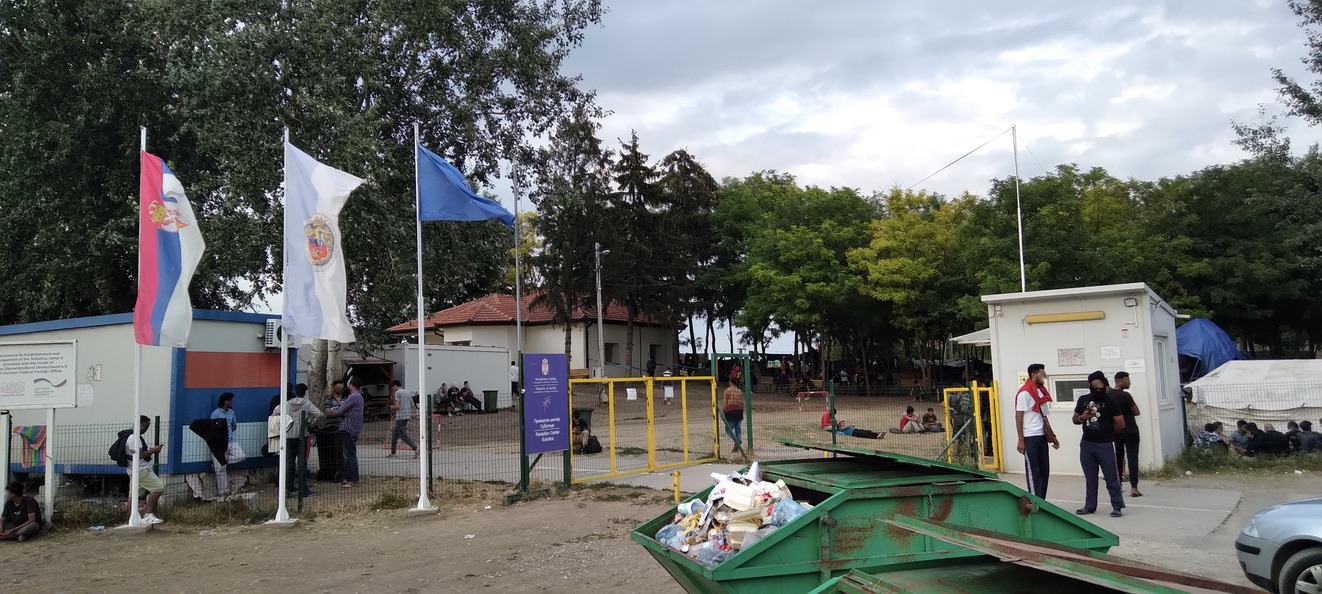
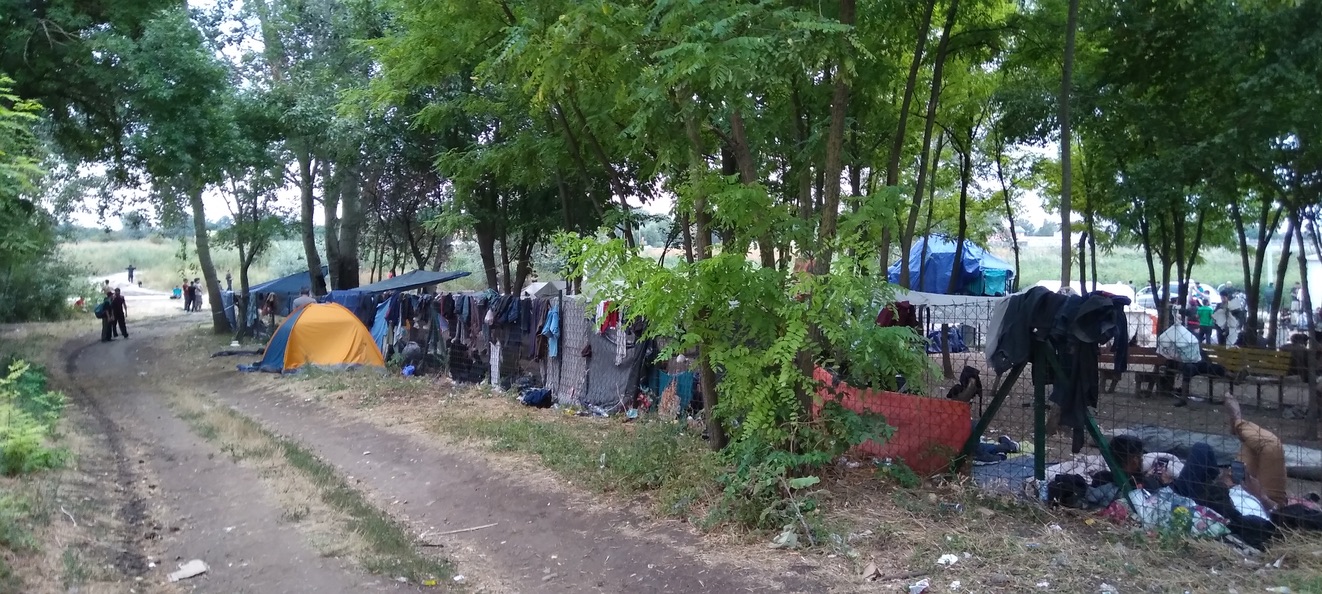

It was the first time that we heard this kind of story, but we were soon to learn that it is a phenomenon that has been widely reported by Bulgarian and international media, and that has been happening since 2016.
Dinko Valev, “a semi professional wrestler and celebrity migrant hunter” 2 has in fact become famous for assaulting and sequestering refugees in the Bulgarian hills with the implicit consent of the local police. The proof of this being plainly available through his videos on his social media platforms, where one can see refugees bound and lying on the ground, waiting for the police to arrive.
An activist we met in Sofia also confirmed this story, and described these groups of self organized citizens as a widespread phenomenon that takes place in most of the south-east of the country. Telling us how they “literally hunt people” with the tacit consent of the government and police officers. The police then also inflict on non european asylum seekers various degrees of violence and torture before pushing them back to Turkey, stripped of all their belongings.
In one of its latest reports, Human Rights Watch described the Bulgarian police as violently pushing people back on the Turkish border 3. While other Serbian NGO’s like Klikaktiv, have reported that there are several cases of death amongst people on the move in Serbia, even though it is difficult to quantify because of the lack of data.
Something that was also reported to be happening in the Bulgarian woods by one of our informants, who participates in the mediterranean allarmphone network, responding to emergency calls from people that fear for their lives, and have no other choice but to call for help. A call that consistently results in the arrival of the police instead of medical aid, and that ends in a violent pushback, or sometimes in the death of the POMs that have called.
By the end of his story, the volunteers had finished dabbing his wounds with Betadine, were taking off their latex gloves, and we were all ready to go to the next point of transit. An abandoned restaurant outside of Sombor, where about 60 people were staying.
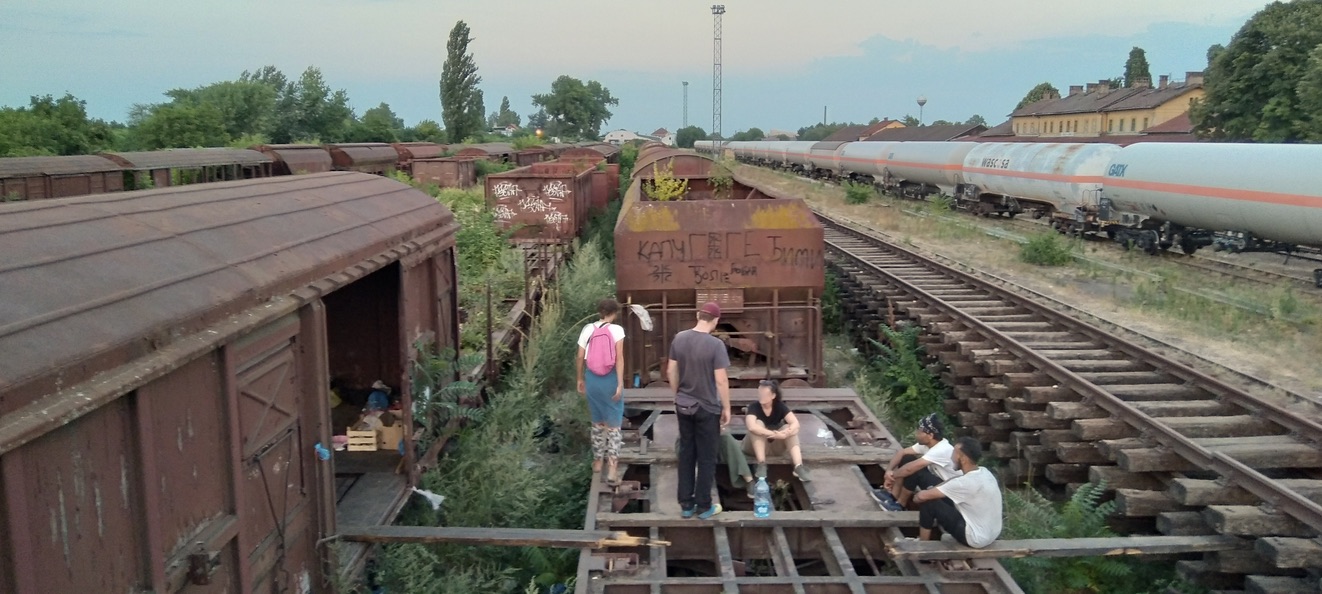
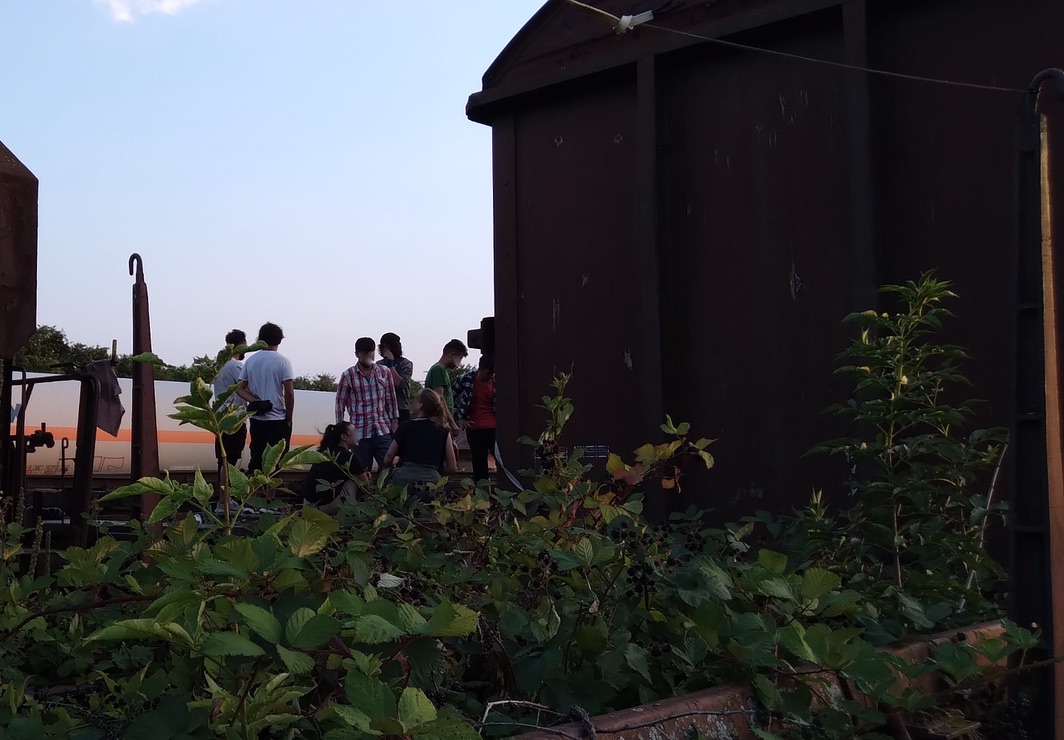
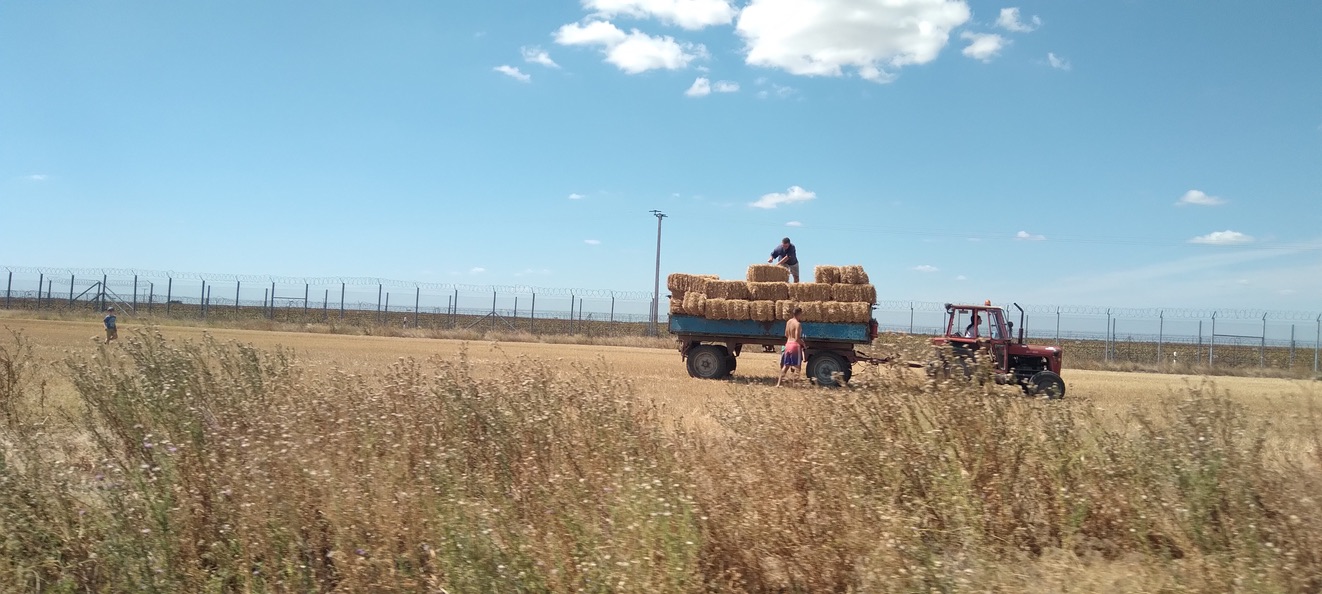
We said goodbye to everyone there thanking them for their hospitality, got back into the van and drove for about 20 minutes in the endless fields of intensive agriculture, interrupted by small patches of trees, and the occasional little group of houses.
The occupied restaurant was on the side of the road, it had clearly been closed for a long time, but it was in better shape than the abandoned factory. When we arrived we parked in the narrow alley on the side, between a willow tree and some people sitting against the restaurant wall. Once we all got out, the people started to get themselves some food and water, while the volunteers helped them to find what they needed.
From the open window on the second floor of the two story building came a baby’s cry while the orange sun lit up the yellow walls. Below, in the willow’s shadow, on the cemented area in front of the restaurant, a few volunteers started to play soccer with a group of children and teenagers, while a row of men sat on a short cement wall with big backpacks on their shoulders, or on the ground in front of them.
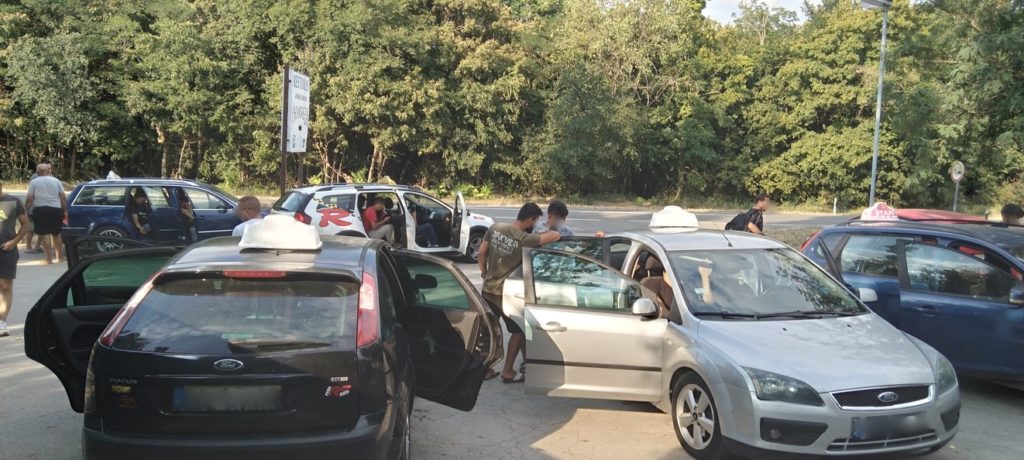
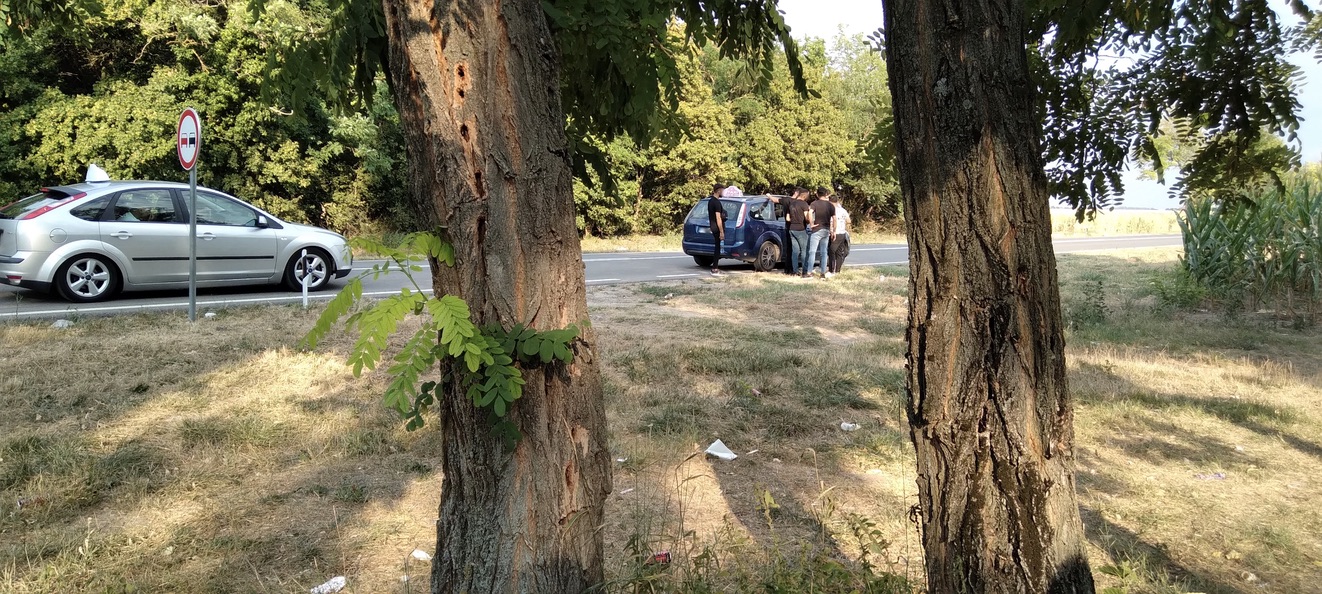
While there we talked to two men traveling with their wives and children. They were staying at the restaurant a couple days before trying “the game” to Hungary, the last border before getting into the Schengen Area. One came from Syria, had blue eyes, a long face and a light brown mustache. The other was Egyptian, wore a black cotton kufi, and a short black beard on a round face. Both of their wives were in the back of the restaurant with the rest of the women and children – occasionally walking by a window, through a door, or could be seen in the distance, sitting in the backyard.
As we spoke, six or seven taxis pulled into the cemented parking lot. The drivers filled up the entire space in front of the building, and talked to each other while leaning on their cars, seemingly waiting around. The kids playing soccer remained unfazed. In the background, a few people went in and out of the restaurant, while the people sitting on the curb progressively split up into groups of four or five, and hopped into the taxis.
«They’re going to the game» said one of the men who was sitting next to us, observing the scene and anticipating our question. «In the next few days I will also go with my family».
In the meanwhile, one of the taxis wouldn’t start. The people got out, and we all pushed it out of the parking lot and down the road. Eventually, after a few tries, and some nervous laughter the engine started, the people got back in, and drove away.
«Inshallah, they will make it» the man with the dark beard said as we sat back down on the cement curb. «Everyday people try, get caught and get sent back by the police. It is very difficult to cross, sometimes they beat us, break our phones, throw away our water and take our things. Then we walk back, and try again another day».
Beside us a girl about 5 years old came to play with a volunteer that was taking a break. A teenager that had been playing football handed each one of us a small red can of an energy drink.
It was jarring to think all those people would be walking for kilometers across wooded areas to reach the fence, and try to climb over the two, 3-meter electrified barrier with barbed wire that separated them from Hungary. Especially knowing from local NGOs that the Hungarian police had started to systematically ram their cars into the ladders people use to cross the fence, often seriously injuring many refugees, and showing no regard for these people’s lives.
«I want to go to Italy because there is a very big Egyptian community there», said the man with the black kufi, while showing one of us his children. The Syrian man with the mustache said he was headed to Germany instead, fiddling with a lighter in his hands, apparently worried for his little daughter’s cough.
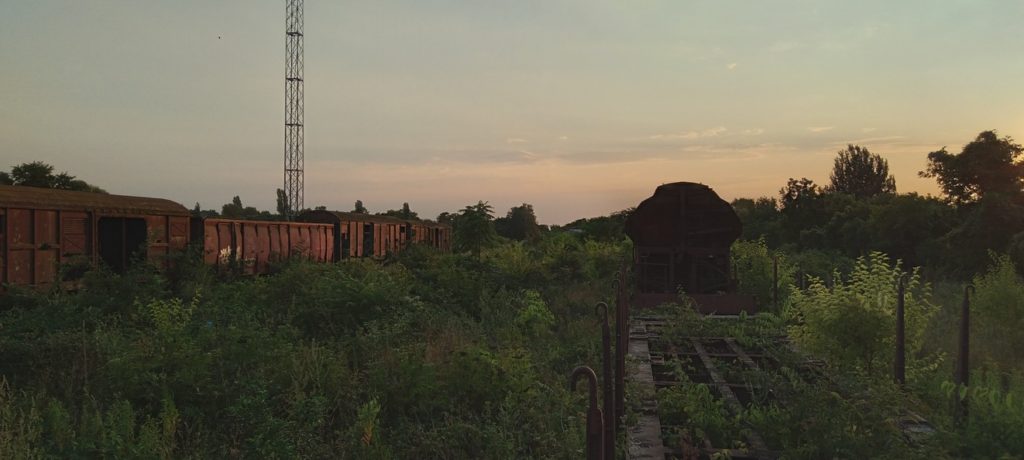
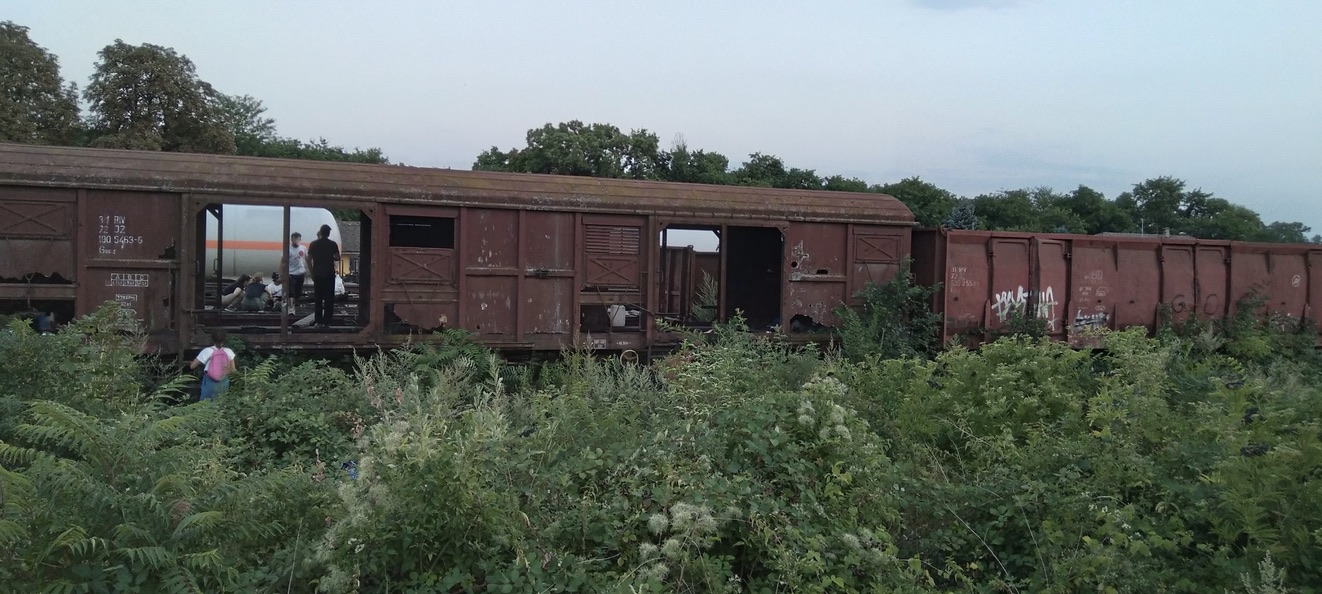
By the time we were ready to leave and go to the last distribution of the day, at the Sombor train station, it was almost dark, and all of the taxis had left.
Once we finished and were leaving from the overgrown side of the Sombor train station – where only a few people were staying in the rusty cargo wagons – we were stopped by two police officers. They searched the van and checked everyone’s documents. After a few questions on what we were doing and for which organization, they let us go, telling us that if they had found a refugee amongst us, we would have been arrested for smuggling.
And no one had a doubt about what they meant. No one thought we would be arrested if we had a Ukrainian refugee with us. Why could it be different, if someone from Syria, Afghanistan, Palestine or Libia was with us?
What was clear, was that each day, with every person forced to move through informal networks and to be subject of such degrees of torture and humiliation, Europe reveals the vastness of the contradictions at play on its borders, and how violent it is when determining who is considered “other”, and not worthy of the human rights granted to an “insider”.
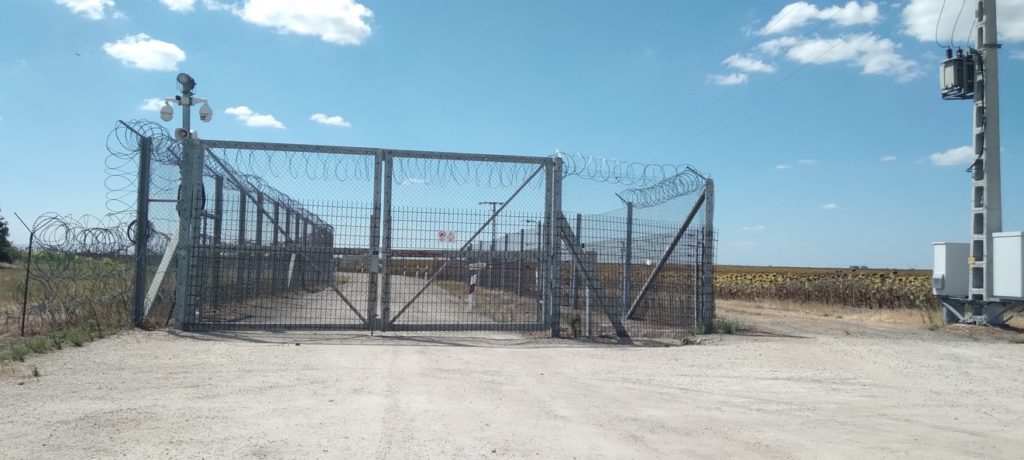
By externalizing and militarizing its borders, Eruope reinforces its status as a gentrified gated community, where only few “outsiders” can enter, after a very competitive selection. EU member States and neighboring Countries enforce with violence a dichotomy of difference between “the West” and the rest of the world, establishing spaces of exception on the periphery, in places like Subotiça, where human rights violations are an everyday reality, and are kept outside of the general public’s field of view.
In the meanwhile, thousands of people knowingly risk their lives and continue to walk towards a fence that will never be too tall for them to climb over, and towards a place where – once inside – you can try to rebuild your life.
Balkan notes: in Timișoara, where the hospitality is differential
The first step of the journey to Sofia, via Šid, Subotica and Belgrade
Balkan notes: in Šid, Serbo-Croatian border
On the road with No Name Kitchen between informal settlements and government camps
- Balkan notes: in Šid, Serbo-Croatian border
- Vigilante Keeps Hunting Migrants In Bulgaria And The Authorities Seem To Be Turning A Blind Eye, by Genka Shikerova – Radio Free Europe/Radio Liberty (9 dicembre 2021)
- Bulgaria: Migrants Brutally Pushed Back at Turkish Border – Human Rights Watch (26 magggio 2022)

